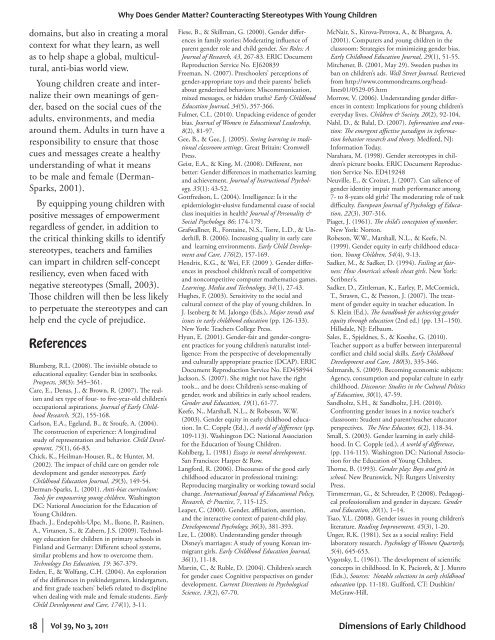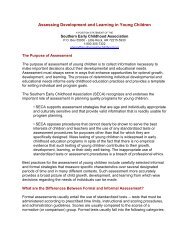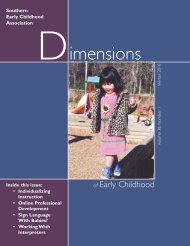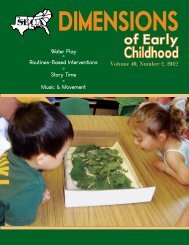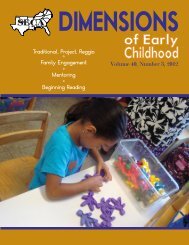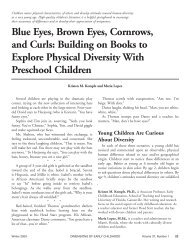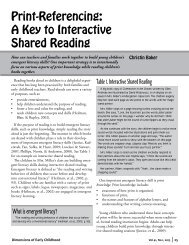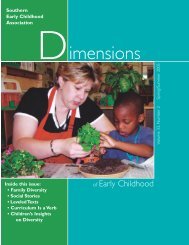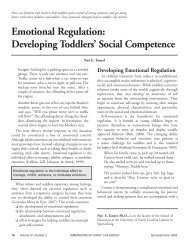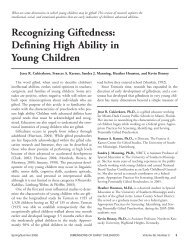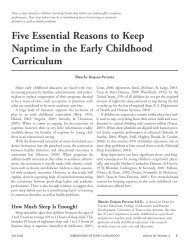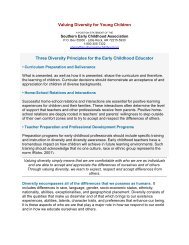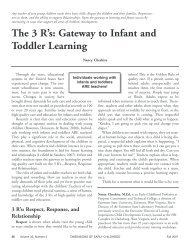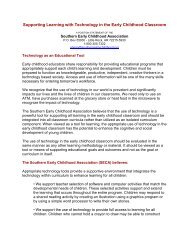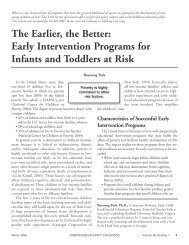Why Does Gender Matter? - Southern Early Childhood Association
Why Does Gender Matter? - Southern Early Childhood Association
Why Does Gender Matter? - Southern Early Childhood Association
Create successful ePaper yourself
Turn your PDF publications into a flip-book with our unique Google optimized e-Paper software.
<strong>Why</strong> <strong>Does</strong> <strong>Gender</strong> <strong>Matter</strong>? Counteracting Stereotypes With Young Children<br />
domains, but also in creating a moral<br />
context for what they learn, as well<br />
as to help shape a global, multicultural,<br />
anti-bias world view.<br />
Young children create and internalize<br />
their own meanings of gender,<br />
based on the social cues of the<br />
adults, environments, and media<br />
around them. Adults in turn have a<br />
responsibility to ensure that those<br />
cues and messages create a healthy<br />
understanding of what it means<br />
to be male and female (Derman-<br />
Sparks, 2001).<br />
By equipping young children with<br />
positive messages of empowerment<br />
regardless of gender, in addition to<br />
the critical thinking skills to identify<br />
stereotypes, teachers and families<br />
can impart in children self-concept<br />
resiliency, even when faced with<br />
negative stereotypes (Small, 2003).<br />
Those children will then be less likely<br />
to perpetuate the stereotypes and can<br />
help end the cycle of prejudice.<br />
References<br />
Blumberg, R.L. (2008). The invisible obstacle to<br />
educational equality: <strong>Gender</strong> bias in textbooks.<br />
Prospects, 38(3): 345–361.<br />
Care, E., Denas, J., & Brown, R. (2007). The realism<br />
and sex type of four- to five-year-old children’s<br />
occupational aspirations. Journal of <strong>Early</strong> <strong>Childhood</strong><br />
Research, 5(2), 155-168.<br />
Carlson, E.A., Egeland, B., & Sroufe, A. (2004).<br />
The construction of experience: A longitudinal<br />
study of representation and behavior. Child Development,<br />
75(1), 66-83.<br />
Chick, K., Heilman-Houser, R., & Hunter, M.<br />
(2002). The impact of child care on gender role<br />
development and gender stereotypes. <strong>Early</strong><br />
<strong>Childhood</strong> Education Journal, 29(3), 149-54.<br />
Derman-Sparks, L. (2001). Anti-bias curriculum:<br />
Tools for empowering young children. Washington<br />
DC: National <strong>Association</strong> for the Education of<br />
Young Children.<br />
Ebach, J., Endepohls-Ulpe, M., Ikone, P., Rasinen,<br />
A., Virtanen, S., & Zabern, J.S. (2009). Technology<br />
education for children in primary schools in<br />
Finland and Germany: Different school systems,<br />
similar problems and how to overcome them.<br />
Technology Des Education, 19: 367-379.<br />
Erden, F., & Wolfang, C.H. (2004). An exploration<br />
of the differences in prekindergarten, kindergarten,<br />
and first grade teachers’ beliefs related to discipline<br />
when dealing with male and female students. <strong>Early</strong><br />
Child Development and Care, 174(1), 3-11.<br />
18 Vol 39, No 3, 2011<br />
Fiese, B., & Skillman, G. (2000). <strong>Gender</strong> differences<br />
in family stories: Moderating influence of<br />
parent gender role and child gender. Sex Roles: A<br />
Journal of Research, 43, 267-83. ERIC Document<br />
Reproduction Service No. EJ620839<br />
Freeman, N. (2007). Preschoolers’ perceptions of<br />
gender-appropriate toys and their parents’ beliefs<br />
about genderized behaviors: Miscommunication,<br />
mixed messages, or hidden truths? <strong>Early</strong> <strong>Childhood</strong><br />
Education Journal, 34(5), 357-366.<br />
Fulmer, C.L. (2010). Unpacking evidence of gender<br />
bias. Journal of Women in Educational Leadership,<br />
8(2), 81-97.<br />
Gee, B., & Gee, J. (2005). Seeing learning in traditional<br />
classroom settings. Great Britain: Cromwell<br />
Press.<br />
Geist, E.A., & King, M. (2008). Different, not<br />
better: <strong>Gender</strong> differences in mathematics learning<br />
and achievement. Journal of Instructional Psychology,<br />
35(1): 43-52.<br />
Gottfredson, L. (2004). Intelligence: Is it the<br />
epidemiologist-elusive fundamental cuase of social<br />
class inequities in health? Journal of Personality &<br />
Social Psychology, 86: 174-179.<br />
Grafwallner, R., Fontaine, N.S., Torre, L.D., & Underhill,<br />
B. (2006). Increasing quality in early care<br />
and learning environments. <strong>Early</strong> Child Development<br />
and Care, 176(2), 157-169.<br />
Hendrix, K.G., & Wei, F.F. (2009 ). <strong>Gender</strong> differences<br />
in preschool children’s recall of competitive<br />
and noncompetitive computer mathematics games.<br />
Learning, Media and Technology, 34(1), 27-43.<br />
Hughes, F. (2003). Sensitivity to the social and<br />
cultural context of the play of young children. In<br />
J. Isenberg & M. Jalongo (Eds.), Major trends and<br />
issues in early childhood education (pp. 126-133).<br />
New York: Teachers College Press.<br />
Hyun, E. (2001). <strong>Gender</strong>-fair and gender-congruent<br />
practices for young children’s naturalist intelligence:<br />
From the perspective of developmentally<br />
and culturally appropriate practice (DCAP). ERIC<br />
Document Reproduction Service No. ED458944<br />
Jackson, S. (2007). She might not have the right<br />
tools... and he does: Children’s sense-making of<br />
gender, work and abilities in early school readers.<br />
<strong>Gender</strong> and Education, 19(1), 61-77.<br />
Keefe, N., Marshall, N.L., & Robeson, W.W.<br />
(2003). <strong>Gender</strong> equity in early childhood education.<br />
In C. Copple (Ed.), A world of difference (pp.<br />
109-113). Washington DC: National <strong>Association</strong><br />
for the Education of Young Children.<br />
Kohlberg, L. (1981) Essays in moral development.<br />
San Francisco: Harper & Row.<br />
Langford, R. (2006). Discourses of the good early<br />
childhood educator in professional training:<br />
Reproducing marginality or working toward social<br />
change. International Journal of Educational Policy,<br />
Research, & Practice, 7, 115-125.<br />
Leaper, C. (2000). <strong>Gender</strong>, affiliation, assertion,<br />
and the interactive context of parent-child play.<br />
Developmental Psychology, 36(3), 381-393.<br />
Lee, L. (2008). Understanding gender through<br />
Disney’s marriages: A study of young Korean immigrant<br />
girls. <strong>Early</strong> <strong>Childhood</strong> Education Journal,<br />
36(1), 11-18.<br />
Martin, C., & Ruble, D. (2004). Children’s search<br />
for gender cues: Cognitive perspectives on gender<br />
development. Current Directions in Psychological<br />
Science, 13(2), 67-70.<br />
McNair, S., Kirova-Petrova, A., & Bhargava, A.<br />
(2001). Computers and young children in the<br />
classroom: Strategies for minimizing gender bias.<br />
<strong>Early</strong> <strong>Childhood</strong> Education Journal, 29(1), 51-55.<br />
Mitchener, B. (2001, May 29). Sweden pushes its<br />
ban on children’s ads. Wall Street Journal. Retrieved<br />
from http://www.commondreams.org/headlines01/0529-05.htm<br />
Morrow, V. (2006). Understanding gender differences<br />
in context: Implications for young children’s<br />
everyday lives. Children & Society, 20(2), 92-104.<br />
Nahl, D., & Balal, D. (2007). Information and emotion:<br />
The emergent affective paradigm in information<br />
behavior research and theory. Medford, NJ:<br />
Information Today.<br />
Narahara, M. (1998). <strong>Gender</strong> stereotypes in children’s<br />
picture books. ERIC Document Reproduction<br />
Service No. ED419248<br />
Neuville, E., & Croizet, J. (2007). Can salience of<br />
gender identity impair math performance among<br />
7- to 8-years old girls? The moderating role of task<br />
difficulty. European Journal of Psychology of Education,<br />
22(3), 307-316.<br />
Piaget, J. (1961). The child’s conception of number.<br />
New York: Norton.<br />
Robeson, W.W., Marshall, N.L., & Keefe, N.<br />
(1999). <strong>Gender</strong> equity in early childhood education.<br />
Young Children, 54(4), 9-13.<br />
Sadker, M., & Sadker, D. (1994). Failing at fairness:<br />
How America’s schools cheat girls. New York:<br />
Scribner’s.<br />
Sadker, D., Zittleman, K., Earley, P., McCormick,<br />
T., Strawn, C., & Preston, J. (2007). The treatment<br />
of gender equity in teacher education. In<br />
S. Klein (Ed.), The handbook for achieving gender<br />
equity through education (2nd ed.) (pp. 131–150).<br />
Hillsdale, NJ: Erlbaum.<br />
Sales, E., Spjeldnes, S., & Koeshe, G. (2010).<br />
Teacher support as a buffer between interparental<br />
conflict and child social skills. <strong>Early</strong> <strong>Childhood</strong><br />
Development and Care, 180(3), 335-346.<br />
Saltmarsh, S. (2009). Becoming economic subjects:<br />
Agency, consumption and popular culture in early<br />
childhood. Discourse: Studies in the Cultural Politics<br />
of Education, 30(1), 47-59.<br />
Sandholtz, S.H., & Sandholtz, J.H. (2010).<br />
Confronting gender issues in a novice teacher’s<br />
classroom: Student and parent/teacher educator<br />
perspectives. The New Educator, 6(2), 118-34.<br />
Small, S. (2003). <strong>Gender</strong> learning in early childhood.<br />
In C. Copple (ed.), A world of difference,<br />
(pp. 114-115). Washington DC: National <strong>Association</strong><br />
for the Education of Young Children.<br />
Thorne, B. (1993). <strong>Gender</strong> play: Boys and girls in<br />
school. New Brunswick, NJ: Rutgers University<br />
Press.<br />
Timmerman, G., & Schreuder, P. (2008). Pedagogical<br />
professionalism and gender in daycare. <strong>Gender</strong><br />
and Education, 20(1), 1–14.<br />
Tsao, Y.L. (2008). <strong>Gender</strong> issues in young children’s<br />
literature. Reading Improvement, 45(3), 1-20.<br />
Unger, R.K. (1981). Sex as a social reality: Field<br />
laboratory research. Psychology of Women Quarterly,<br />
5(4), 645-653.<br />
Vygotsky, L. (1961). The development of scientific<br />
concepts in childhood. In K. Paciorek, & J. Munro<br />
(Eds.), Sources: Notable selections in early childhood<br />
education (pp. 11-18). Guilford, CT: Dushkin/<br />
McGraw-Hill.<br />
Dimensions of <strong>Early</strong> <strong>Childhood</strong>


